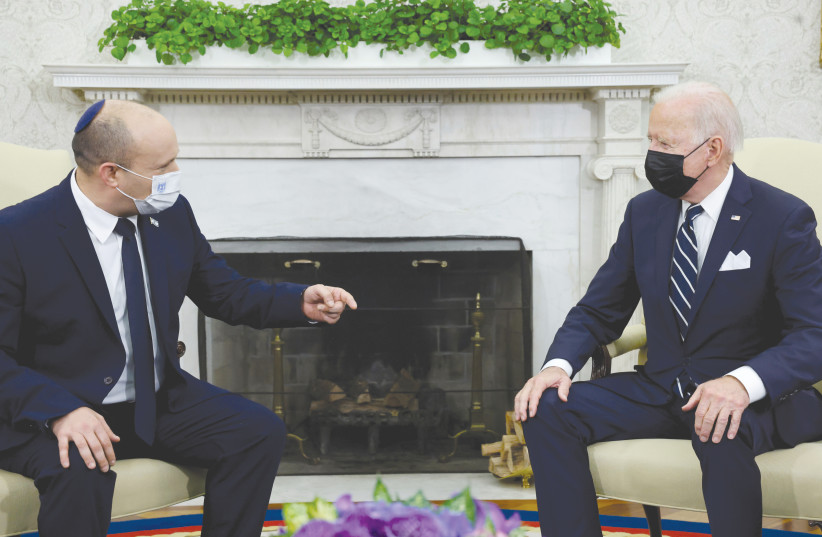The United States and the E3 (Germany, France and Britain) urged Iran on Saturday to resume compliance with the 2015 nuclear deal in order to “avoid a dangerous escalation.”
Leaders of the four countries, who are hoping to convince Tehran to stop enriching uranium to near-weapons-grade levels, said they wanted a negotiated solution.
“This will only be possible if Iran changes course,” US President Joe Biden, German Chancellor Angela Merkel, French President Emmanuel Macron and British Prime Minister Boris Johnson said in a joint statement they issued on the sidelines of the G20 summit in Rome.
The four leaders are expected to also participate in the UN Climate Change Conference (COP26) in Glasgow that starts on Sunday.
Prime Minister Naftali Bennett is also expected to attend COP26. He will meet with Johnson and Macron on the sidelines of that event.

Bennett is opposed to the 2015 Iran deal, known as the Joint Comprehensive Plan of Action (JCPOA).
The 2015 nuclear deal unraveled after then-US President Donald Trump withdrew from it in 2018, prompting Iran to breach various limits on uranium enrichment.
Talks between Iran and world powers aimed at salvaging the deal, which started in April, are slated to resume at the end of November, the Islamic Republic’s top nuclear negotiator said on Wednesday.
Asked as he went into Saturday’s meeting when he wanted the Iran talks to resume, Biden said only that “they’re scheduled to resume.”
A senior US official told reporters that the meeting on Iran at the G20 gathering had been suggested by Merkel with the aim of giving leaders an opportunity to review the issues ahead of the resumption of the talks.
In their joint statement, the four leaders said they call “upon President [Ibrahim] Raisi to seize this opportunity and return to a good faith effort to conclude our negotiations as a matter of urgency. That is the only sure way to avoid a dangerous escalation, which is not in any country’s interest.”
They said that during their conversation they had shared their “grave and growing concern that, while Iran halted negotiations on a return to the JCPOA since June, it has accelerated the pace of provocative nuclear steps, such as the production of highly enriched uranium and enriched uranium metal.
“These steps have only been made more alarming by Iran’s simultaneously decreased cooperation and transparency with the International Atomic Energy Agency (IAEA). We agreed that continued Iranian nuclear advances and obstacles to the IAEA’s work will jeopardize the possibility of a return to the JCPOA,” the leaders stated.
Separately, Merkel said “the clock is ticking. Uranium enrichment is occurring in Iran and this deeply concerns us.”
Israel has similarly been concerned that Iran is playing for time in delaying the negotiations so that it can further its nuclear ambitions.
On Friday the US issued a fresh round of Iran-related sanctions tied to an Islamic Revolutionary Guard Corps drone program that it said threatened regional stability, the Treasury Department said.
US officials, in a statement, said the IRGC has been providing UAVs or drones for use by Iran-backed groups, including the Lebanese terror group Hezbollah, and in crisis-hit Ethiopia.
“Iran’s proliferation of UAVs across the region threatens international peace and stability. Iran and its proxy militants have used UAVs to attack US forces, our partners, and international shipping,” Deputy Treasury Secretary Wally Adeyemo said. “Treasury will continue to hold Iran accountable for its irresponsible and violent acts.”
The sanctions announced Friday target four people, including Islamic Revolutionary Guard Corps Brig.-Gen. Saeed Aghajani, who the US says oversees the UAV operations of the Aerospace Force.
The Treasury Department’s actions also target two companies – Kimia Part Sivan Co. and Oje Parvaz Mado Nafar Co. – that it said procured components for the program and provided other assistance.
The sanctions will block access to property subject to US jurisdiction of the persons designated, while US persons are generally prohibited from engaging in transactions with the designated persons or their blocked property, the Treasury said.
Iranian Foreign Ministry spokesman Saeed Khatibzadeh told the country’s state media that “the imposition of new sanctions reflects the completely contradictory behavior of the White House (which) speaks of its intention to return to the nuclear accord and continues to impose sanctions.”
